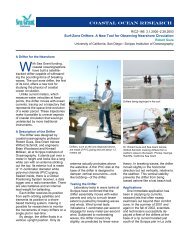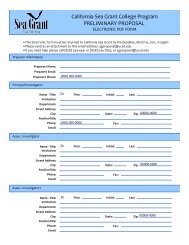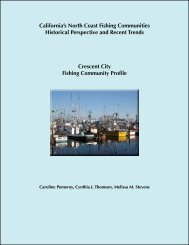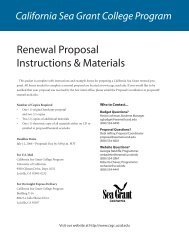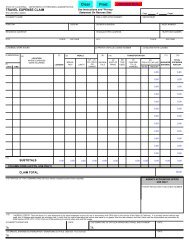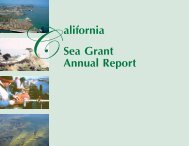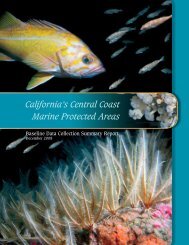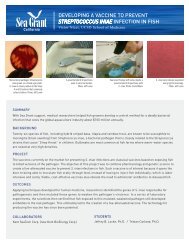PAT-UC Covers - California Sea Grant - UC San Diego
PAT-UC Covers - California Sea Grant - UC San Diego
PAT-UC Covers - California Sea Grant - UC San Diego
Create successful ePaper yourself
Turn your PDF publications into a flip-book with our unique Google optimized e-Paper software.
Program Accomplishments & Impacts<br />
I. ORGANIZATION & MANAGEMENT<br />
Leadership of <strong>California</strong> <strong>Sea</strong> <strong>Grant</strong><br />
<strong>California</strong> <strong>Sea</strong> <strong>Grant</strong> uses a management team style for all<br />
key program decisions. The team is comprised of: Director,<br />
Deputy Director, Associate Director for Extension, Research and<br />
Education Program Manager, Communications Director and<br />
Fiscal Officer. More often than not, one or more staff persons<br />
join management team meetings, which are held approximately<br />
once per month, usually in the La Jolla office. Topics of<br />
meetings including issues such as decisions on funding,<br />
allocation of program resources, key decisions on outreach<br />
activities, and requests for program development and rapid<br />
response funds. All of the members of the management team<br />
have 100 percent FTEs devoted to CSG. See Appendix A for an<br />
organizational chart of CSG.<br />
In addition to members of the management team, staff<br />
associated with CSG management include: two assistants to<br />
the fiscal officer, one computer/web specialist, one proposal<br />
coordinator, and one program assistant. Each of these five staff<br />
members has a 100 percent appointment to CSG. There is also<br />
a half-time specialist assisting the Deputy Director with special<br />
projects.<br />
One key aspect of management is the process of program selfevaluation<br />
and improvement. Recognizing that a weakness<br />
for CSG was overall program integration, beginning in 2001<br />
a series of three program-wide retreats were held for program<br />
evaluation and strategic planning. The first of these retreats<br />
held in March 2001 was facilitated by Dr. Harvey Liss, an expert<br />
in strategic planning. In aggregate, the three retreats focused<br />
on the task of working more as a single program and planning<br />
for the future. Between these retreats, extension staff meetings<br />
are held three times a year. The Director and other members of<br />
the administration and communications staff often join these<br />
meetings.<br />
<strong>California</strong> <strong>Sea</strong> <strong>Grant</strong> uses a model with three advisory bodies<br />
(see Appendix B for a complete list). The principal one is<br />
the <strong>California</strong> <strong>Sea</strong> <strong>Grant</strong> Advisory Board. This twenty-one<br />
member board advises the <strong>UC</strong> Vice Provost for research.<br />
Approximate membership is one representative from eight<br />
<strong>UC</strong> campuses, one representative from the <strong>California</strong> State<br />
University (CSU) system, one representative of Cooperative<br />
Extension, one additional academic representative, and ten<br />
nonacademic members representing a broad spectrum of<br />
external stakeholders. The Advisory Board meets approximately<br />
twice per year and considers a broad range of topics such as<br />
recommendations on strategic and implementation plans,<br />
suggestions on proposal review protocols, advice on interacting<br />
with universities and <strong>California</strong> state agencies, and guidance on<br />
the intellectual thrust of the program. Member terms are three<br />
years with option for renewal.<br />
The second advisory body is the <strong>California</strong> <strong>Sea</strong> <strong>Grant</strong><br />
Committee. This is a standing committee that serves<br />
the specific function of review and recommendations on<br />
preliminary and full proposals. There are eight members<br />
of this committee, coming mostly, but not exclusively, from<br />
academic institutions. In the past two years, the membership<br />
of this committee was greatly changed to ensure there is no<br />
conflict of interest during proposal review. As a result, all but<br />
one of the eight members come from outside of <strong>California</strong>.<br />
The lone <strong>California</strong>n is from the National Marine Fisheries<br />
Service (NMFS) Southwest Fisheries Science Center in La Jolla<br />
and does not have academic institutional conflicts. Ad hoc<br />
members are added to the <strong>California</strong> <strong>Sea</strong> <strong>Grant</strong> Committee<br />
as needed to round out the subject matter expertise of the<br />
committee to ensure all topics are covered during the review<br />
phase. Each member serves a three-year term.<br />
The third advisory body is the Resources Agency <strong>Sea</strong><br />
<strong>Grant</strong> Advisory Panel (RASGAP) and is comprised mostly<br />
of representatives from state agencies. The panel meets<br />
annually to allocate general fund money and provide input<br />
and recommendations from a state agency perspective on<br />
preliminary proposals submitted to CSG and University<br />
of Southern <strong>California</strong> (USC) <strong>Sea</strong> <strong>Grant</strong>. There is one<br />
representative from the <strong>UC</strong> system, one from the CSU system,<br />
one from USC, and several members from marine industries.<br />
Panel member terms are indefinite in length.<br />
<strong>California</strong> <strong>Sea</strong> <strong>Grant</strong> Retreat, 2001. (L to R) Marsha Gear, Gretchen<br />
Frederick, and marine advisors, Rick Starr and Susan McBride.<br />
3<br />
<strong>California</strong> <strong>Sea</strong> <strong>Grant</strong>: 1998-2003



